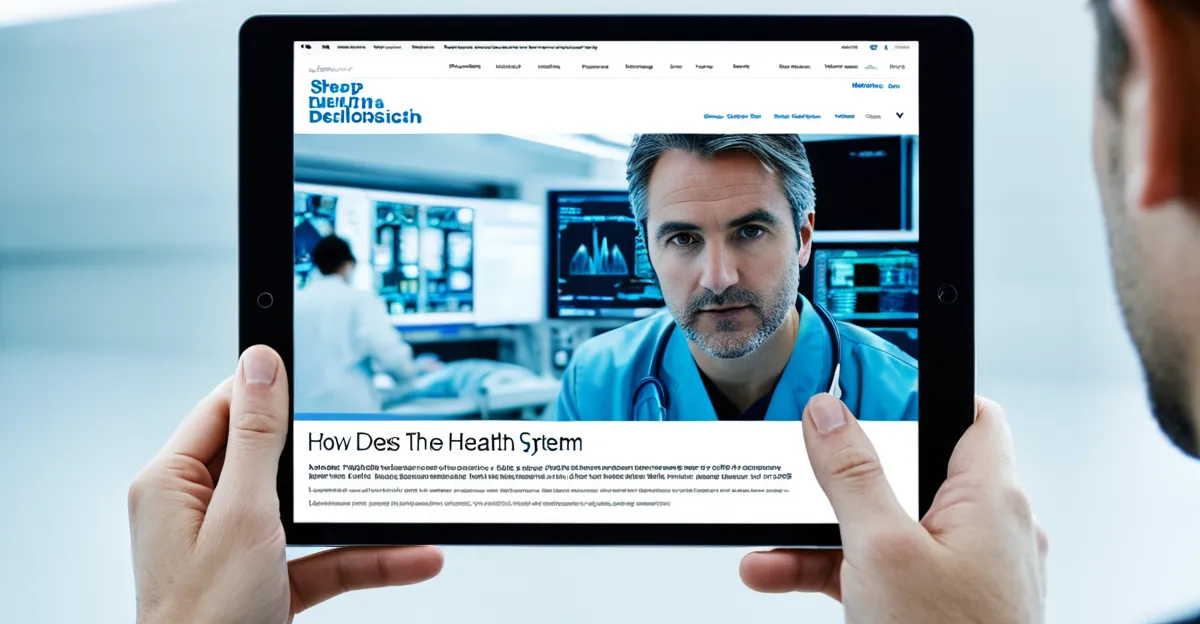Overview of the UK Health System and Technological Advancements
The UK Health System has undergone significant transformations since its inception in the 1940s, evolving to meet the changing healthcare needs of the population. This historical evolution laid the foundation for embracing technological advancements that are reshaping patient care and administrative processes.
Technological advancements in healthcare refer to innovations such as digital tools, electronic systems, and other tech-driven solutions that enhance both treatment outcomes and operational efficiencies. These advancements are not just about new gadgets or software; they encompass a broader integration of technology into the healthcare ecosystem, which includes areas like telemedicine, electronic health records (EHR), and artificial intelligence (AI).
Also to see : How Can You Ensure Optimal Health Through the UK Healthcare System?
Adapting to new technologies is crucial for the sustainability and improvement of the UK Health System. As these technologies continue to advance, healthcare providers must remain agile, ensuring they are equipped to implement innovations effectively. Embracing these changes promises to bring about more personalized patient experiences, improved healthcare innovation, and greater accessibility to healthcare services across the UK.
It’s essential to understand that technology integration is not without challenges. However, the commitment to overcoming these obstacles highlights the importance of a proactive approach to healthcare innovation. By doing so, the UK Health System can continue to improve service delivery, patient satisfaction, and health outcomes in an increasingly digital world.
Have you seen this : What Factors Could Affect Future Trends in UK Health Policies?
Current Technologies in the UK Health System
In the rapidly evolving landscape of the UK Health System, several technologies are at the forefront, revolutionizing how healthcare is delivered. Current healthcare technologies are not only improving patient care but also streamlining processes for healthcare professionals. This section explores telemedicine, Electronic Health Records (EHR), and AI integration—key technologies reshaping the healthcare sector.
Telemedicine Solutions
Telemedicine has become a cornerstone of modern healthcare, transforming patient interaction by providing remote consultation services. In the UK, the adoption of telemedicine has increased, especially during the COVID-19 pandemic. Innovative telemedicine solutions offer significant benefits, such as increased accessibility to medical specialists and reduced waiting times for patients. However, challenges persist, including ensuring equitable access and maintaining data security. Successful implementation case studies, like the NHS England’s “GP at Hand” service, highlight the effectiveness of telemedicine in delivering healthcare to diverse populations, showcasing its potential to complement traditional healthcare models.
Electronic Health Records (EHR)
Electronic Health Records (EHR) systems are pivotal in modernizing patient data management in the UK. With adoption rates steadily rising, EHRs have completely transformed how patient information is accessed and shared among healthcare providers. The impact on patient care is significant, offering better coordination and reduced risk of errors. From a regulatory perspective, UK healthcare facilities are required to adhere to strict compliance standards to ensure data privacy and security. The shift towards comprehensive EHR systems signifies a crucial step in the broader healthcare innovation landscape, enabling a seamless flow of information and enhancing overall service delivery.
AI Integration in Healthcare
Artificial Intelligence (AI) is progressively being integrated into the UK Health System, providing innovative healthcare solutions that enhance diagnostic accuracy and treatment effectiveness. Current AI applications include predictive analytics for patient outcomes and automated interpretation of medical imaging. Case studies demonstrate AI’s transformative impact, such as Moorfields Eye Hospital’s collaboration with DeepMind to improve eye disease diagnoses. The future potential of AI is immense, with possibilities to revolutionize personalized medicine and offer predictive insights that could shape healthcare delivery. As AI technologies advance, their integration promises to further elevate the quality and efficiency of healthcare in the UK.
Case Studies of Adaptation
Adapting to technological advancements within the UK Health System has revealed insights into both successes and setbacks in healthcare innovation. Successful adaptation case studies highlight the strategic implementation of new technologies, noticeably improving patient care and operational efficiency. For instance, the integration of telemedicine solutions in urban hospitals like Birmingham’s Queen Elizabeth Hospital saw a significant reduction in patient wait times and enhanced access to specialist consultations. This success stemmed from early stakeholder engagement, which ensured that technology adoption met both provider capabilities and patient needs.
Conversely, some UK healthcare facilities faced challenges, particularly where adaptation failed. A notable example involved the initial implementation of Electronic Health Records (EHR) systems in certain rural clinics. These setbacks often resulted from inadequate training for healthcare professionals and insufficient IT support, demonstrating the critical importance of comprehensive preparation and resource allocation. Lessons learned from these failures underline the necessity for thorough planning and ongoing evaluation throughout the technology integration process.
Stakeholders, including government bodies, healthcare professionals, and technology providers, play a pivotal role in facilitating successful technological adaptation. Their collaboration is essential in overcoming barriers and fostering a culture receptive to innovative change. Ensuring consistent dialogue and training opportunities across all levels empowers these stakeholders to contribute effectively to the evolution of the UK Health System.
Statistics on Implementation and Impact
In recent years, the UK Health System has seen significant adoption of healthcare technologies, transforming both patient care and operational efficiencies. Accurate healthcare statistics provide insight into these advancements, highlighting both successes and areas requiring attention.
Adoption Rates and Success Metrics
Statistical data reveal a steady increase in the adoption rate of technologies such as telemedicine and Electronic Health Records (EHR). Over 80% of UK healthcare facilities now utilize EHR systems, reflecting a commitment to modernizing patient data management. Meanwhile, telemedicine services have expanded, with several trusts reporting a 50% rise in remote consultations during the pandemic. Metrics show these technologies have enhanced access to care, expedited treatment, and improved patient satisfaction.
Impact on Patient Outcomes and Efficiency
Post-implementation metrics point to notable improvements in patient outcomes and healthcare efficiency. The automation of data processes through EHRs has reduced administrative burdens, allowing professionals to prioritize patient interaction. For instance, EHR implementation led to a 30% reduction in medication errors. Telemedicine has also broken geographical barriers, resulting in timely specialist consultations and better-managed chronic conditions, underscoring its role in technology impact.
Comparative Analysis
When comparing the UK to other healthcare systems, its technology integration stands out for both its scale and scope. The UK’s structured approach outpaces many countries, though challenges remain in ensuring universal adoption. Countries like Sweden, however, still lead in nationwide EHR use, offering a benchmark for further improvements.
By consistently analyzing and addressing implementation success rates, the UK Health System can advance its healthcare innovation initiatives. Continued investment and refinement will further enhance these metrics, driving sustained improvements in patient care.
Challenges Facing the UK Health System
The UK Health System faces numerous challenges in effectively implementing technological advancements, key among them being barriers to innovation and resistance to change. These hurdles significantly affect the pace and success of technology transitions, revealing areas that require strategic attention to facilitate smoother adaptation processes.
Identification of Key Barriers to Technology Implementation
Several barriers impede the integration of technology within the healthcare sector. Primarily, the financial constraints pose substantial obstacles as the costs associated with adopting and maintaining new technologies can be burdensome. Furthermore, there’s often a lack of infrastructure to support these innovations, particularly in rural areas where healthcare facilities may not have the necessary technological foundations.
Stakeholder Resistance and How It Affects Progress
Resistance from stakeholders, including healthcare professionals and patients, often stems from concerns over job security and apprehensions about adapting to new systems. Such resistance is compounded when stakeholders do not have adequate training or understanding of the benefits that these technologies can bring. This scepticism can slow down the adoption rates as stakeholders may be hesitant to fully embrace or trust new tools, affecting overall progress.
Regulatory and Financial Challenges in Adopting New Technologies
The regulatory landscape also presents its own set of challenges. Compliance with strict data protection and privacy regulations can be daunting, making healthcare providers cautious in their approach to digitization initiatives. Moreover, the bureaucratic processes involved in gaining approvals for new technologies can delay implementation timelines. Financially, despite the long-term savings digital tools offer, initial investment requirements can deter adoption, especially when funding is limited.
Addressing these challenges is crucial for the successful integration of healthcare innovation within the UK Health System. By proactively tackling barriers, engaging stakeholders early, and creating flexible regulations, the system can better harness technological advancements to improve healthcare services.
Future Trends in Healthcare Technology
As we peer into the future of the UK Health System, emerging technologies promise to revolutionize healthcare beyond the current capabilities. The momentum gained through initial innovations like telemedicine, Electronic Health Records (EHR), and AI is paving the way for the integration of avant-garde tools that could dramatically shift patient care and healthcare management.
Predictions for the Future of Technology in the UK Health System
The next wave of technological advancements is expected to enhance precision medicine, wherein treatments are tailored to individual patient profiles. This will be supported by advancements in genomics and biometrics, offering unprecedented personalization. Furthermore, the integration of wearable technology and the Internet of Things (IoT) in daily health monitoring is anticipated, providing real-time data and predictive diagnostics that preemptively address health concerns.
Analysis of Emerging Technologies and Their Potential Impact
Emerging technologies like blockchain are promising to revamp data security and patient privacy, ensuring that sensitive health information is meticulously safeguarded. Robotic-assisted surgery continues to advance, enhancing surgical precision and patients’ recovery rates. Meanwhile, virtual reality (VR) applications in pain management and medical training are seen as revolutionary, offering immersive experiences that enhance understanding and treatment delivery.
The Role of Policy in Shaping Future Technology Adoption
Policy frameworks will be foundational in navigating the integration of these innovative technologies. Government regulations will need to evolve in tandem with the pace of innovation to address ethical, privacy, and compliance challenges effectively. Encouraging investment in health technology development and ensuring equitable access to these technologies are critical components of policy planning. Engaging in proactive dialogue among stakeholders will enable adaptive policies that facilitate innovations’ smooth adoption, ensuring they enhance healthcare delivery effectively.







